|
|
|
Sort Order |
|
|
|
Items / Page
|
|
|
|
|
|
|
| Srl | Item |
| 1 |
ID:
153895
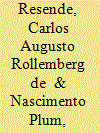

|
|
|
|
|
| Summary/Abstract |
The Brazilian-Argentine Agency for Accounting and Control of Nuclear Materials (ABACC) is a unique bilateral nonproliferation regime created by Brazil and Argentina after a long process of negotiations and confidence building. The creation of the agency in July 1991 marked a paradigmatic shift in the Brazilian-Argentine relationship, converting their long rivalry into a profound strategic partnership. This article presents a historical overview of the creation of ABACC and discusses how it paved the way for the integration of Brazil and Argentina into the nonproliferation regime. The article also shows how ABACC tackled nonproliferation challenges in the twenty-first century, helping Brazil and Argentina continue their nuclear programs with fewer risks to the autonomy and development goals traditionally defended in their foreign policies.
|
|
|
|
|
|
|
|
|
|
|
|
|
|
|
|
| 2 |
ID:
157913
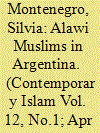

|
|
|
|
|
| Summary/Abstract |
This article examines contemporary aspects of the identity construction of the ‘Alawi diaspora in Argentina. In the local context, the preservation of ‘Alawi singularity has so far been a key element in the group’s identity. The strategies for integration as legitimate Muslims in the wider Islam and the closeness to Shi’ism are relatively independent of how these processes took place in the homeland. I first describe the geography of the diaspora in Argentina, comprising the spaces and institutions where descendants settled all over the country. I analyze the factors that helped keep the nodes connected and I will demonstrate that these constitute a center/periphery logic for communities concerning the alleged degrees of preservation of the culture of origin they symbolize. I will try to show that ‘Alawis integrated into the diversity of Islam in Argentina while preserving their sectarian borders and, at the same time, stressing an “Arab” identity. I argue that these strategies should be understood in the local arena of an intra-Islamic pluralism that constitutes Muslim presence in Argentina, where the dynamics of sectarianisms assume idiosyncratic characteristics. Finally, I will show institutional closeness to Shi’ism as a recent development, promoted by the common political stance of both groups on the conflict in Syria. We will see that this closeness does not imply the dissolution of doctrinal boundaries between Shi’is and ‘Alawis and that it involves a redefinition of the diaspora in terms of increasingly claiming a Syrian national origin.
|
|
|
|
|
|
|
|
|
|
|
|
|
|
|
|
| 3 |
ID:
139995


|
|
|
|
|
| Summary/Abstract |
During the quarter century before the First World War, anarchist terrorism was often blamed on the impact of anarchist agitators on naïve immigrants. This article seeks to investigate the truth of this claim, focusing particularly on Italian emigrants, but also looking at some examples of Spanish, French, and Russian emigrants. My conclusion is that, with a few exceptions, radicals emigrated, but emigration did not create radical terrorists. A particularly good example of this can be found by examining the large Italian emigration to Argentina. At most, the emigrant experience may have heightened a pre-existing radicalism or given more precise configuration to its violent expression.
|
|
|
|
|
|
|
|
|
|
|
|
|
|
|
|
| 4 |
ID:
131163
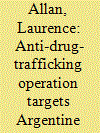

|
|
|
| 5 |
ID:
140921
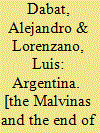

|
|
|
|
|
| Publication |
Mexico City, Conflicto Malvinense y Crisis Nacional, 1982.
|
| Description |
205p.pbk
|
| Standard Number |
0860910857
|
|
|
|
|
|
|
|
|
|
|
|
Copies: C:1/I:0,R:0,Q:0
Circulation
| Accession# | Call# | Current Location | Status | Policy | Location |
| 025469 | 982.064/DAB 025469 | Main | On Shelf | General | |
|
|
|
|
| 6 |
ID:
140922
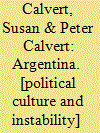

|
|
|
|
|
| Edition |
1st ed.
|
| Publication |
Hampshire, Macmillan Press Ltd, 1989.
|
| Description |
xiv, 327p.: plates, maphbk
|
| Standard Number |
0333451651
|
|
|
|
|
|
|
|
|
|
|
|
Copies: C:1/I:0,R:0,Q:0
Circulation
| Accession# | Call# | Current Location | Status | Policy | Location |
| 031164 | 982/CAL 031164 | Main | On Shelf | General | |
|
|
|
|
| 7 |
ID:
133459
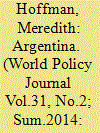

|
|
|
|
|
| Publication |
2014.
|
| Summary/Abstract |
When the peso hit rock bottom in January, Ande Wanderer rang up her money dealer-a former official in Argentina's national government. She'd sold off her stocks, cashed in her American savings, and wired him the money. Now she rushed to his office, a ninth floor room in downtown Buenos Aires. The official exchange rate was 8 pesos to the dollar. But her dealer gave her 11-the black market rate at the time-and kept a small fee for himself. That meant she got some 40 percent more pesos for her U.S. money.
|
|
|
|
|
|
|
|
|
|
|
|
|
|
|
|
| 8 |
ID:
089937
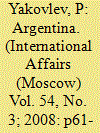

|
|
|
|
|
| Publication |
2008.
|
| Summary/Abstract |
That was not the first time in its almost 200-year history that the Argentine Republic abruptly altered the vector of its development. The previous period of structural reform was in the 1990s, passing under the sign of neoliberalism. Over a number of years, the country served as an example of a "successful" transplantation of the principles of market fundamentalism and monetarism to Latin American soil, while the chief Argentine neoliberal - Economy Minister Domingo Cavallo - became Wall Street's favorite, according to the US media. The monetarist experiment in Argentina ended in a deep economic and sociopolitical crisis of 2001-02, which highlighted the pressing need for a change in the national development paradigm.
|
|
|
|
|
|
|
|
|
|
|
|
|
|
|
|
| 9 |
ID:
119857
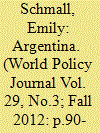

|
|
|
|
|
| Publication |
2012.
|
| Summary/Abstract |
Chubut, Argentina-In mid-June, at the onset of winter in the Southern Hemisphere, a gang of burly, masked construction workers took over Cerro Dragón, an oil and gas field 15 times the size of Buenos Aires and Argentina's most important source of hydrocarbons. Some 500 members of a union nicknamed the Dragons wrecked offices, spray-painted seditious messages on buildings, and barricaded access routes with torched cars in a scene Pan American Energy's chief executive Oscar Prieto compared to battle-scarred Baghdad. The disarray forced Pan American-majority-owned by oil giant BP, with China's CNOOC holding a 20 percent share-to halt production in the field for the first time in its more than 50 years of operations. The threat was calculated to irk a government already spending heavily on imported energy and that has demonstrated its willingness to take over companies.
|
|
|
|
|
|
|
|
|
|
|
|
|
|
|
|
| 10 |
ID:
013548
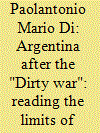

|
|
|
|
|
| Publication |
Oct/Dec1997.
|
| Description |
433-65
|
|
|
|
|
|
|
|
|
|
|
|
|
|
|
|
| 11 |
ID:
129760
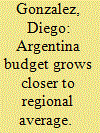

|
|
|
| 12 |
ID:
165050
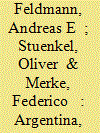

|
|
|
|
|
| Summary/Abstract |
This article examines the role of Argentina, Brazil and Chile (the ‘ABC countries’) in supporting democracy through the logic of consequences and appropriateness in three emblematic cases: the removal of President Zelaya in Honduras in 2009, the constitutional crisis that led to the removal of President Fernando Lugo in Paraguay 2012 and the sudden closing of the National Assembly in Venezuela in 2017. The authors argue that the ABC governments’ responses to governance crises have been shaped by a mixture of motivations, both instrumental (geopolitical interest or ideological affinity) and ideational (a normative preference for democracy). This mixture has resulted in inconsistent policies deriving from the mismatch between the normative commitments made by these countries, enshrined in multilateral instruments such as democracy clauses, which have often limited their room for manoeuvre, and their preference for a measured, prudent foreign policy based upon traditional principles of non-intervention. Specifically, the authors find that the ABC countries’ stance on democracy support depends on two fundamental conditions: their leverage vis-à-vis the target state and the degree of certainty regarding a potential resolution of a given democratic crisis.
|
|
|
|
|
|
|
|
|
|
|
|
|
|
|
|
| 13 |
ID:
053181
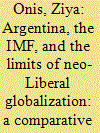

|
|
|
| 14 |
ID:
167297
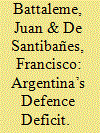

|
|
|
|
|
| Summary/Abstract |
Argentina’s lack of operationally effective armed forces makes it an anomaly in the international system.
|
|
|
|
|
|
|
|
|
|
|
|
|
|
|
|
| 15 |
ID:
118277


|
|
|
|
|
| Publication |
2013.
|
| Summary/Abstract |
[D]emocracy is at risk of losing its meaning and purpose in the hands of presidents who, while freely elected, crush freedom once in office.
|
|
|
|
|
|
|
|
|
|
|
|
|
|
|
|
| 16 |
ID:
091547
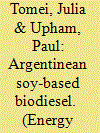

|
|
|
|
|
| Publication |
2009.
|
| Summary/Abstract |
This paper explores the economic, social and environmental context, drivers and impacts of increased demand for Argentine soy-based biodiesel. It is based on extensive stakeholder interviews in Argentina, including those in government, academia and the third sector; as well as participant observation with communities in soy cultivation areas; and review of relevant academic and grey literatures. Given Argentina's history of political instability and relatively weak levels of environmental protection, there is reason to be sceptical of the likely effectiveness of biofuel sustainability certification as applied to Argentine soy. Direct contracts between feedstock producers and biodiesel retailers may be a more reliable approach to minimise adverse environmental and social impacts than certification alone.
|
|
|
|
|
|
|
|
|
|
|
|
|
|
|
|
| 17 |
ID:
053198
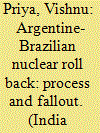

|
|
|
|
|
| Publication |
Jan-Jun 2004.
|
|
|
|
|
|
|
|
|
|
|
|
|
|
|
|
| 18 |
ID:
121080
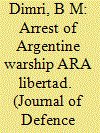

|
|
|
|
|
| Publication |
2013.
|
| Summary/Abstract |
The ARA Libertad Case (Argentina v. Ghana) is the first instance where the International Tribunal for the Law of the Sea (ITLOS), Hamburg, Germany considered the issue of the release of a warship which was detained in a foreign port contrary to the principles of sovereign immunity of warships. The Argentinian warship was detained based on a commercial case filed by an American hedge fund against Argentina in the Ghanaian Court. According to the Court, Argentina had waived sovereign immunity in respect of the claims of the bondholders and, therefore, the warship could be arrested for execution of a monetary claim. This article examines the ITLOS order at the backdrop of warship rights and duties under the International Law of the Sea.
|
|
|
|
|
|
|
|
|
|
|
|
|
|
|
|
| 19 |
ID:
076722
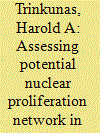

|
|
|
|
|
| Publication |
2006.
|
| Summary/Abstract |
From a proliferation perspective, Latin America has become one of the most denuclearized regions of the planet, and barring some revolutionary transformation of the international system, it is likely to remain so during the next decade. A combination of a paucity of credible external threats, widespread democratization, and the systematic resolution of border conflicts, particularly in the Southern Cone region, mean that states in the region do not see the value of acquiring nuclear weapons as a deterrent. The two states in the region with the most advanced civilian nuclear programs, Argentina and Brazil, have created a sophisticated mutual inspection regime that is an additional barrier to the development of any new proliferation network, and both states have a strong interest in maintaining a benign regional security environment. Venezuela's radical leader, Hugo Chávez, has expressed an interest in developing a nuclear power program, raising concerns among some observers over a potential new proliferation risk. However, Venezuela currently lacks the scientific and management expertise required to master nuclear technology within the next decade.
|
|
|
|
|
|
|
|
|
|
|
|
|
|
|
|
| 20 |
ID:
114498
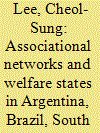

|
|
|
|
|
| Publication |
2012.
|
| Summary/Abstract |
This article investigates the structures of civic networks and their roles in steering the political choices of party and union elites regarding the retrenchment or expansion of welfare states in four recently democratized developing countries. Utilizing coaffiliation networks built upon two waves of World Values Surveys and evidence from comparative case studies for Argentina, Brazil, South Korea, and Taiwan, the study develops two explanatory factors that account for variations in welfare politics: cohesiveness and embeddedness. In Argentina and, to a lesser degree, in Taiwan, party and union leaders' cohesive relationships, being disarticulated from the informal civic sphere, allowed them to conduct elite-driven social policy reforms from above, by launching radical neoliberal reforms (Argentina) or by developing a generous transfer-centered welfare state (Taiwan). In Brazil and South Korea, however, party and union leaders' durable solidarity embedded in wider civic communities enabled them to resist the retrenchment of welfare states (Brazil) or implement universal social policies (South Korea) based on bottom-up mobilization of welfare demands. This article demonstrates that elites in the formal sector make markedly different political choices when confronting economic crisis and democratic competition depending upon their organizational connections in formal and informal civic networks.
|
|
|
|
|
|
|
|
|
|
|
|
|
|
|
|
|
|
|
|
|